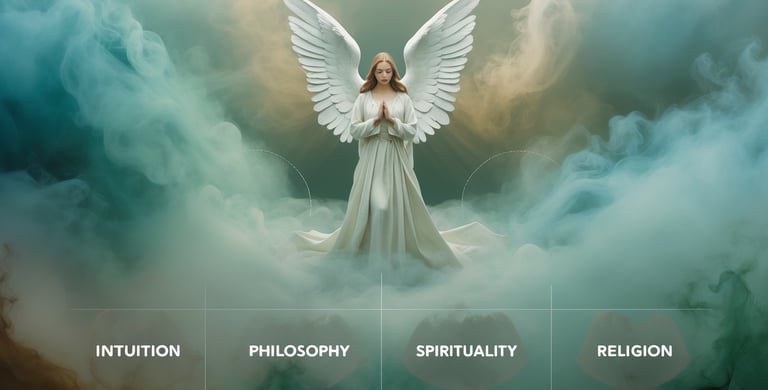When God Bleeds: Theodicy Theories Across the Ages
Why Do the Righteous Suffer, and Tyrants Thrive?
4FORTITUDEI - INTUITION, SPIRITUALITY, PHILOSOPHY, RELIGION
When God Bleeds: Theodicy Theories Across the Ages
Why Do the Righteous Suffer, and Tyrants Thrive?
A sacred scroll tracing humanity’s fiercest question—the problem of suffering—across the world’s great traditions. This is not theology for comfort, but the battlefield cry of those who have watched innocence burn.
“Shall not the Judge of all the earth do what is just?” — Genesis 18:25
I. The Ancient Agony — Why Do the Innocent Suffer?
The problem of evil is not philosophical first—it is personal.
A child dies.
A tyrant prospers.
A prayer goes unanswered.
And in the quiet, men ask: If God is good, why does He allow this?
Theodicy is the defense of divine justice in a world scarred by suffering. But not all traditions answer it the same way. Some justify. Some transcend. Some dare to accuse. All confront mystery.
Let us trace the great answers—the sacred attempts to hold heaven and horror in the same breath.
II. Christianity — Suffering as Redemptive Mystery
Core Theodicy: Suffering exists because of sin, but is transformed through Christ.
Augustinian Theodicy: Evil is not a created thing, but a privation of good—a corruption of will.
Irenaean Theodicy: Suffering is a tool for soul-making; it matures us into the image of God.
Cruciform Theodicy: God does not observe suffering from afar—He enters it. The cross is the divine protest and participation.
“By His wounds we are healed.” — Isaiah 53:5
God’s justice is not always visible. But it is promised. Final judgment reorients temporal chaos.
III. Hinduism — Karma and the Cosmic Ledger
Core Theodicy: Suffering is the unfolding of karma—moral cause and effect across lifetimes.
Actions (karma) determine one’s circumstances.
Suffering may arise from past lives, not just present deeds.
“As a man sows, so shall he reap.” — Bhagavad Gita
The suffering of the righteous may not be injustice—but the balancing of invisible scales. Ultimate justice is cosmic, not immediate.
Yet Hinduism also affirms Bhakti (devotion): God can be approached not only as judge, but as beloved, and His grace transcends karma.
IV. Buddhism — Suffering as Illusion and Attachment
Core Theodicy: Life is suffering (dukkha), caused by desire and ignorance.
Suffering is not “unfair”—it is inherent to conditioned existence.
The path to end suffering is noble eightfold wisdom, not retribution.
“The cause of suffering is attachment.” — The Buddha
Buddhism sidesteps theodicy by rejecting a personal, omnipotent deity. It does not defend a divine being, but offers a map out of pain.
Liberation comes not by blaming God—but by extinguishing illusion.
V. Judaism — Covenant and Wrestling
Core Theodicy: Suffering is part of covenant tension, divine discipline, and human freedom.
Job’s protest is never silenced—only enveloped by the voice of the whirlwind.
Lament is sacred. Questions are not betrayal—they are prayer.
“Though He slay me, yet will I trust in Him.” — Job 13:15
The Holocaust shattered modern Jewish theodicy. Thinkers like Elie Wiesel and Richard Rubenstein demand a God who listens, or else a God to be rejected.
Judaism does not resolve theodicy—it lives within it.
VI. Islam — Submission and Divine Wisdom
Core Theodicy: Suffering is a test, and Allah’s wisdom transcends human understanding.
All things happen by divine will (Qadr).
Trials purify the soul and distinguish the faithful.
Justice will be exacted in the next life.
“And We will surely test you… but give good tidings to the patient.” — Qur’an 2:155
The believer is called not to understand everything, but to trust the Judge of all judges.
VII. Taoism — Harmony, Not Justice
Core Theodicy: Suffering arises from disharmony with the Tao, not moral failure.
The Tao does not punish—it flows.
The wise man yields to its currents.
Resistance creates pain.
“The sage accepts all as the unfolding of the Way.” — Tao Te Ching
Justice is not a courtroom verdict, but a balance of forces. Theodicy dissolves into alignment.
VIII. Gnosticism — Creation as Prison
Core Theodicy: This world is not just broken—it is enslaved by a false god (the Demiurge).
True divinity lies beyond the material veil.
Suffering is proof of the counterfeit nature of the world.
“The world is not what it seems—it is what it hides.”
Salvation comes not through endurance, but through awakening—the retrieval of divine spark through gnosis.
Gnosticism doesn’t solve theodicy. It overthrows the world that makes it necessary.
IX. Embodiment & Transmission
Write Your Own Theodicy: What is your working belief about why God allows suffering?
Study Job Aloud: Read it as drama, not doctrine. Wrestle with its rage and silence.
Learn One Sacred Theodicy per Month: Teach it to your children.
Create a Family Lament Ritual: Space to grieve with dignity.
Volunteer Where Innocence Suffers: Be an embodied theodicy.
Practice Devotional Silence: Not every pain needs solving—some need presence.
Fast During Crisis: Align your body to spiritual endurance.
Read Martyr Stories as Resistance Literature.
Memorize One Psalm of Protest (e.g., Psalm 13): Teach your sons that prayer can shout.
Honor the Unknown: Build a shrine or journal page for questions without answers.
Final Charge & Irreducible Transmission
Theodicy is not about solving suffering. It is about sacralizing it.
The traditions of the world offer not certainty—but structure, language, and posture to face the flame.
Remember: God may not explain—but He enters.
Sacred Question: In your suffering, do you demand clarity—or communion?
Call-to-Action: Trace your theology of suffering. Strengthen it. Test it. Hand it down like fire.
Two Bold Actions:
Begin a father-son discussion on theodicy using Job, Christ, or the martyrs.
Offer comfort to one who suffers—not with answers, but with unflinching presence.
Every tradition faces the fire. The righteous bleed. But those who endure become the proof that God remains.


